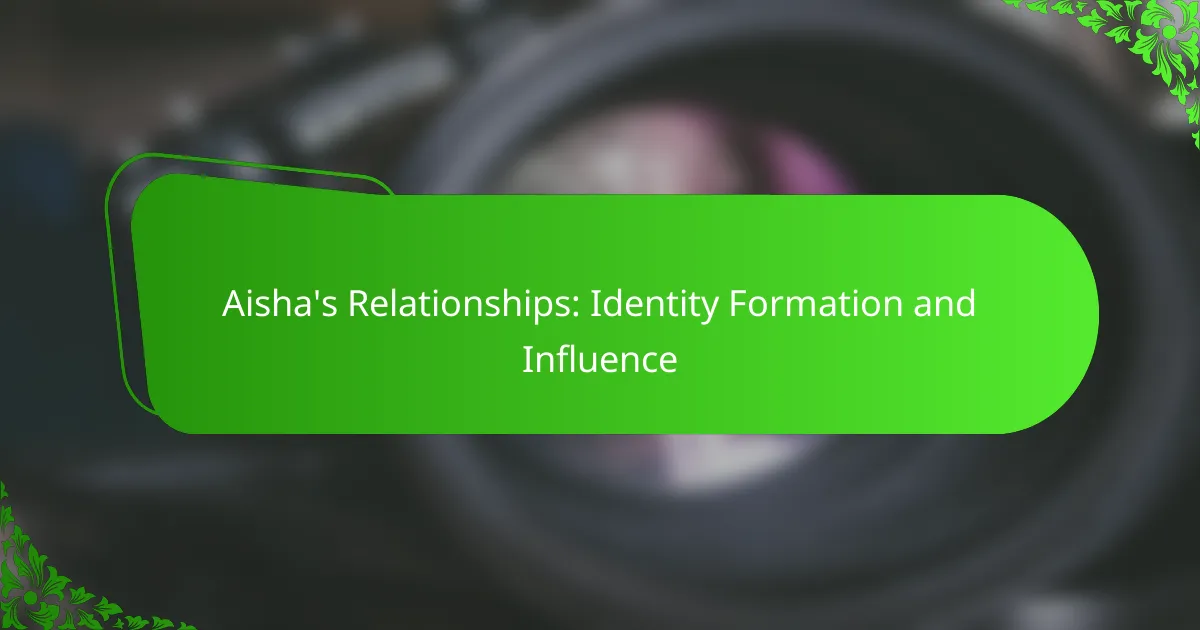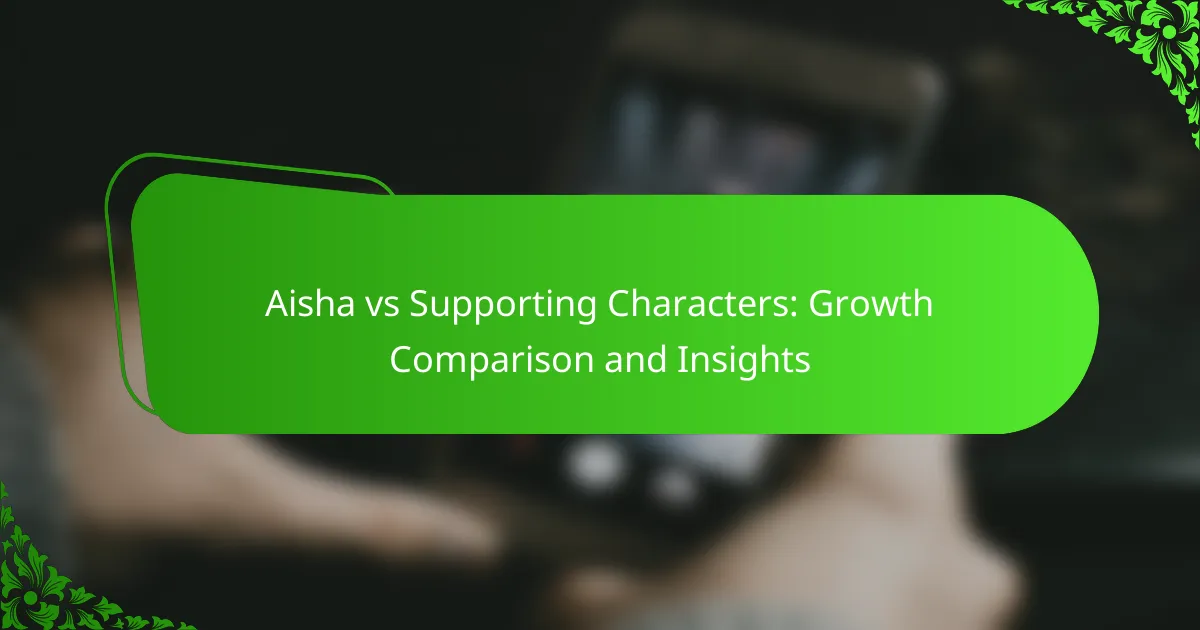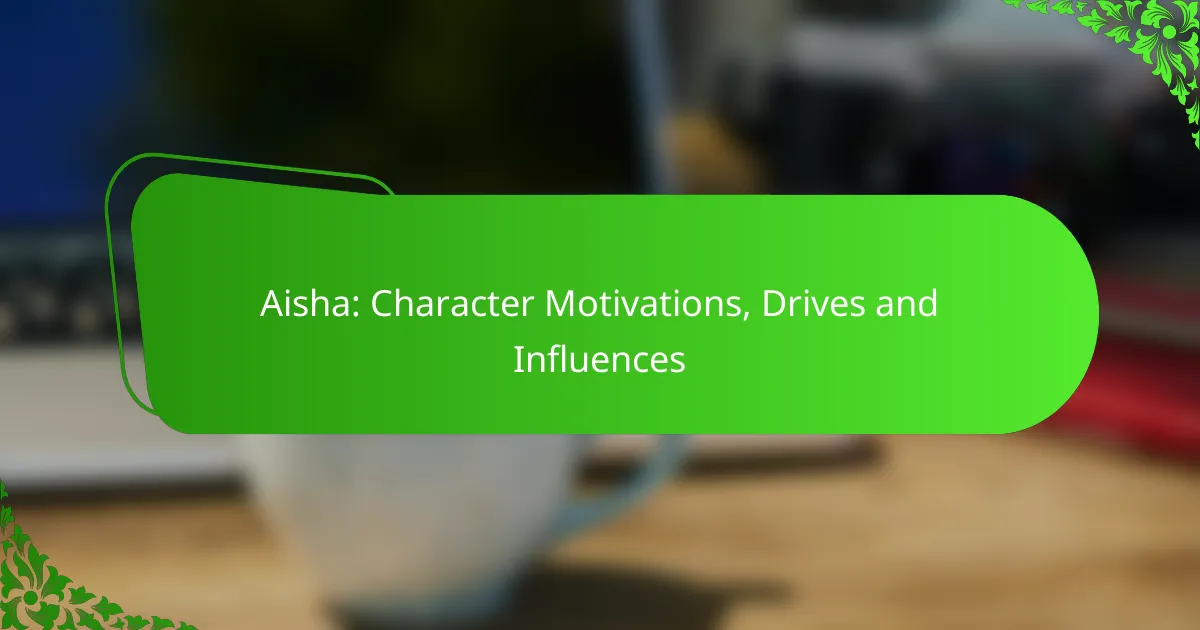Aisha’s relationships play a pivotal role in shaping her identity, influencing her values, beliefs, and self-perception. As she interacts with family, friends, and romantic partners, these connections guide her personal growth and understanding of herself. Various factors, such as her cultural background and socioeconomic status, further shape how she engages with others, highlighting the complexity of her relational dynamics.
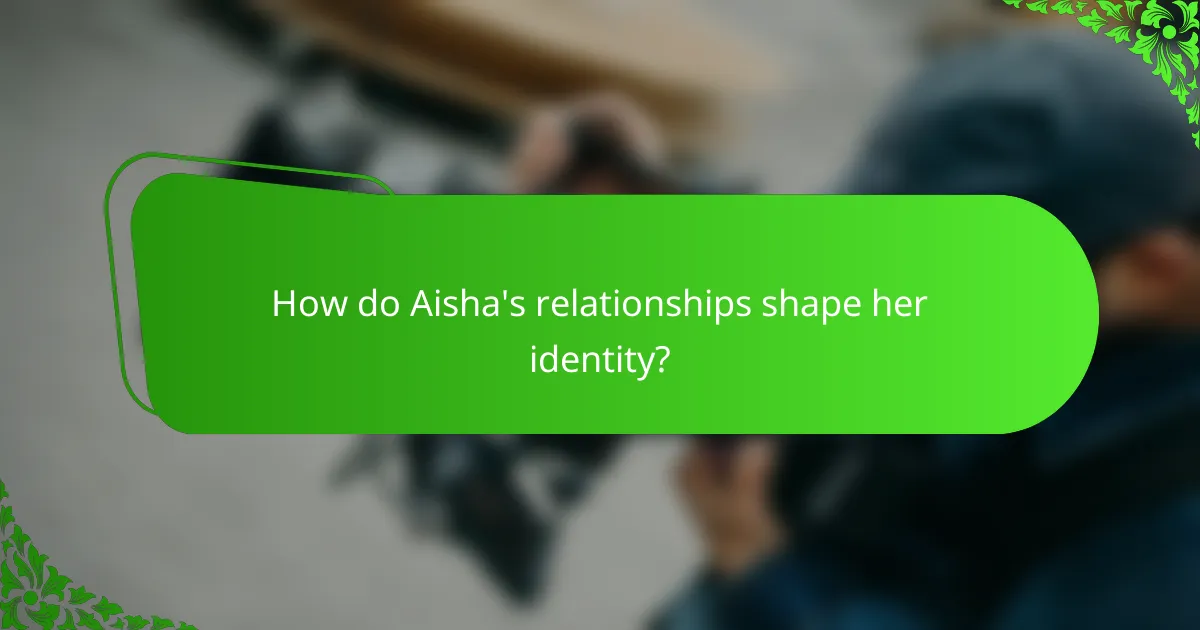
How do Aisha’s relationships shape her identity?
Aisha’s relationships significantly influence her identity by providing a framework for her values, beliefs, and self-perception. Through interactions with family, friends, and romantic partners, she navigates her sense of self and personal growth.
Influence of family dynamics
Family dynamics play a crucial role in shaping Aisha’s identity. The values instilled by her parents and siblings often dictate her worldview and behavior. For instance, a supportive family environment can foster confidence and resilience, while a dysfunctional one may lead to insecurity and self-doubt.
Understanding family roles and communication styles can help Aisha navigate her identity formation. Recognizing patterns such as favoritism or conflict can guide her in establishing healthier relationships outside the family unit.
Impact of friendships
Friendships are vital in Aisha’s identity development, offering companionship and a sense of belonging. Positive friendships can enhance her self-esteem and provide diverse perspectives that challenge her existing beliefs. Conversely, toxic friendships may lead to negative self-perception and hinder personal growth.
Aisha should seek friendships that encourage authenticity and support her goals. Regularly evaluating her social circle can help her identify relationships that uplift her versus those that detract from her identity.
Role of romantic relationships
Romantic relationships significantly impact Aisha’s identity by influencing her emotional well-being and self-image. A healthy partnership can enhance her sense of self-worth and provide emotional support, while an unhealthy relationship may lead to confusion and diminished self-esteem.
It’s essential for Aisha to establish boundaries and communicate openly in her romantic relationships. Reflecting on her needs and values can help her choose partners who align with her identity and contribute positively to her personal growth.
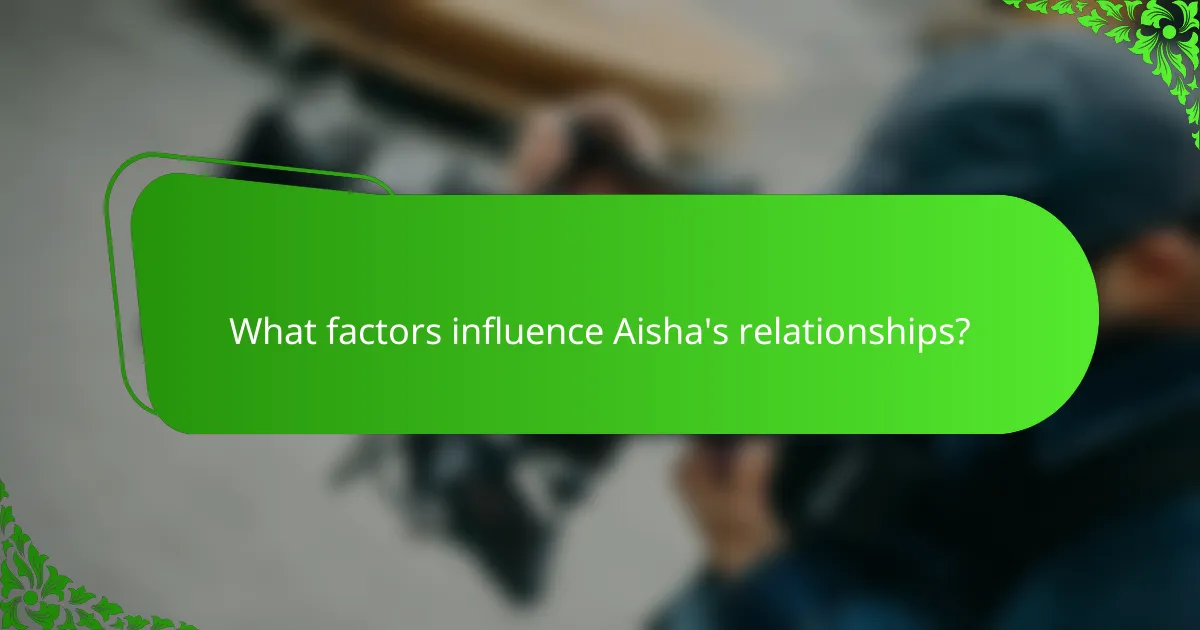
What factors influence Aisha’s relationships?
Aisha’s relationships are shaped by various factors, including her cultural background, socioeconomic status, and personal experiences. Each of these elements plays a crucial role in how she interacts with others and forms connections.
Cultural background
Aisha’s cultural background significantly influences her relationships by dictating social norms, values, and expectations. For instance, in cultures that prioritize collectivism, Aisha may feel a stronger obligation to maintain family ties and community connections.
Understanding cultural nuances can help Aisha navigate her relationships more effectively. She might consider how traditions, language, and shared beliefs impact her interactions with friends and family, fostering deeper connections.
Socioeconomic status
Aisha’s socioeconomic status affects her relationships through access to resources and opportunities. Individuals from higher socioeconomic backgrounds may have more access to social networks, education, and career prospects, which can enhance their relationship-building capabilities.
Conversely, those from lower socioeconomic backgrounds might face challenges such as limited time and financial constraints, which can strain relationships. Aisha should be aware of these dynamics and seek to build connections that are supportive and understanding of her circumstances.
Personal experiences
Aisha’s personal experiences, including past relationships and life events, shape her perspectives and behaviors in current interactions. Positive experiences can lead to trust and openness, while negative ones may result in caution or defensiveness.
Reflecting on her experiences can help Aisha identify patterns in her relationships. She should consider what has worked well in the past and what hasn’t, allowing her to make informed choices about who to engage with and how to foster healthy connections.

How can Aisha navigate relationship challenges?
Aisha can navigate relationship challenges by focusing on open communication, setting clear boundaries, and seeking professional guidance when necessary. These strategies help her build healthier connections and address conflicts effectively.
Effective communication strategies
Effective communication is essential for Aisha to express her feelings and needs clearly. She should practice active listening, which involves fully concentrating on what the other person is saying before responding. This approach fosters understanding and reduces misunderstandings.
Using “I” statements can also help Aisha communicate her feelings without sounding accusatory. For example, saying “I feel upset when…” rather than “You always make me upset…” encourages a more constructive dialogue.
Setting boundaries
Setting boundaries is crucial for Aisha to maintain her well-being in relationships. She should identify her limits regarding time, emotional investment, and personal space. Clearly communicating these boundaries helps others understand her needs and expectations.
Aisha can use simple phrases like “I need some time to myself” or “I’m not comfortable discussing that” to assert her boundaries. It’s important for her to be consistent in enforcing these limits to ensure they are respected.
Seeking professional guidance
When relationship challenges become overwhelming, seeking professional guidance can provide Aisha with valuable support. A therapist or counselor can offer insights and tools tailored to her specific situation, helping her navigate complex emotions and conflicts.
Group therapy or support groups can also be beneficial, as they allow Aisha to connect with others facing similar challenges. This shared experience can foster a sense of community and provide additional coping strategies.

What role does social media play in Aisha’s relationships?
Social media significantly shapes Aisha’s relationships by influencing her self-perception and the way she connects with others. It provides a platform for expression and interaction, but it also introduces challenges related to authenticity and comparison.
Influence on self-image
Social media can greatly affect Aisha’s self-image by presenting curated versions of reality. She may compare herself to others based on their posts, leading to feelings of inadequacy or pressure to conform to certain standards. This can result in a distorted view of her own identity and worth.
To mitigate negative impacts, Aisha should focus on engaging with content that promotes positivity and self-acceptance. Setting boundaries on social media use can help maintain a healthier self-image by reducing exposure to unrealistic portrayals.
Impact on interpersonal connections
Aisha’s relationships can be both enriched and strained by social media. On one hand, it allows her to maintain connections with friends and family across distances, facilitating communication and shared experiences. On the other hand, it can lead to misunderstandings and conflicts due to misinterpretations of online interactions.
To foster positive connections, Aisha should prioritize face-to-face interactions when possible and use social media as a supplement rather than a replacement. Being mindful of the tone and context of her messages can also help prevent potential conflicts and enhance her relationships.
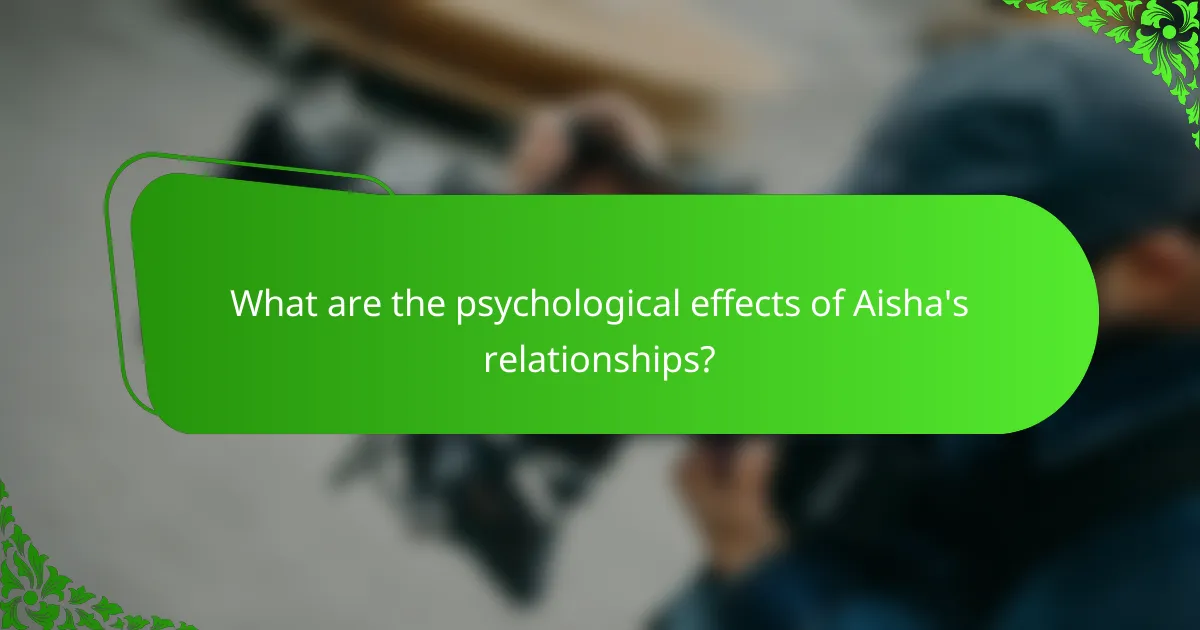
What are the psychological effects of Aisha’s relationships?
Aisha’s relationships can significantly impact her psychological well-being, shaping her identity and influencing her mental health. These effects can manifest in various ways, affecting her self-perception and emotional stability.
Effects on mental health
Relationships can have both positive and negative effects on Aisha’s mental health. Supportive connections often lead to increased feelings of happiness and reduced anxiety, while toxic relationships may contribute to stress and depression. Understanding the dynamics of these relationships is crucial for maintaining mental wellness.
For instance, Aisha may experience a boost in mood when surrounded by encouraging friends, whereas conflicts with a close family member could lead to heightened emotional distress. Recognizing these patterns can help her navigate her social interactions more effectively.
Influence on self-esteem
Aisha’s relationships play a vital role in shaping her self-esteem. Positive feedback and validation from peers can enhance her self-worth, while criticism or neglect can diminish it. The way she perceives herself is often influenced by how others treat her.
To foster healthy self-esteem, Aisha should seek relationships that uplift and empower her. Engaging in activities that promote self-acceptance and surrounding herself with supportive individuals can create a more positive self-image. Avoiding relationships that consistently bring her down is essential for her emotional health.

How do Aisha’s relationships reflect broader societal trends?
Aisha’s relationships illustrate significant societal trends, particularly in how gender roles and cultural expectations evolve. These dynamics not only shape her personal identity but also mirror the changing landscape of societal norms and values.
Gender roles in relationships
Gender roles in Aisha’s relationships highlight traditional expectations that often dictate behavior and responsibilities. For instance, in many cultures, women are still expected to take on nurturing roles, while men are seen as providers. Aisha’s experiences may challenge or conform to these norms, reflecting a broader societal shift towards more egalitarian partnerships.
As relationships evolve, there is a growing trend towards shared responsibilities, where both partners contribute equally to household duties and decision-making. This shift can lead to more balanced dynamics, fostering mutual respect and collaboration.
Shifts in cultural expectations
Cultural expectations surrounding relationships are continuously changing, influenced by globalization and increased access to diverse perspectives. Aisha’s relationships may reflect a blend of traditional values and modern ideals, such as prioritizing personal fulfillment and emotional connection over societal approval.
For example, many young people today prioritize compatibility and shared interests over family expectations, leading to a rise in interfaith and intercultural relationships. This trend signifies a move away from rigid norms, allowing individuals like Aisha to define their relationships on their own terms.






